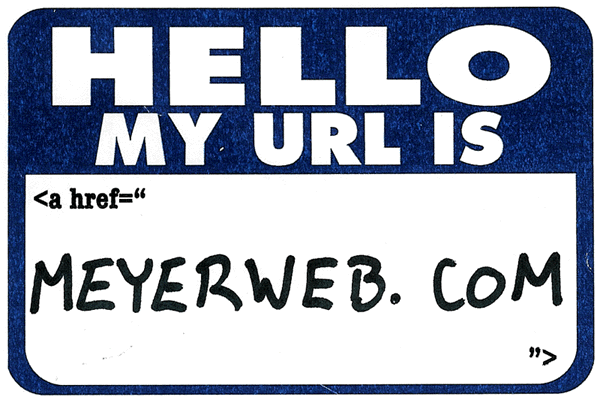2009 201: Difference between revisions
No edit summary |
|||
| (6 intermediate revisions by the same user not shown) | |||
| Line 1: | Line 1: | ||
http://complexspiral.com/events/archive/2004/notacon/friendly/my-url-is.png | http://complexspiral.com/events/archive/2004/notacon/friendly/my-url-is.png | ||
== Web Fundamentals == | |||
* HTTP | * Internet vs. Web | ||
* | * Berners-Lee | ||
* | * [[Protocol]] | ||
* URL | * [[HyperText]] | ||
* | * [[HTTP]] | ||
* | * [[IP Address]] | ||
* [[Domain Name]] | |||
* [[URL]] | |||
* Index.html / Index Views | |||
* [[HTML]] | |||
* Browsers | |||
* [[HTTP]] | |||
== Reading == | == Performance / Reading == | ||
In class, we "enacted" the text of the online discussion surrounding [http://1997.webhistory.org/www.lists/www-talk.1993q1/0182.html Mark Andreessen's proposal] of the <img> tag. | |||
== Exercise == | == Exercise == | ||
| Line 22: | Line 26: | ||
== Resources == | == Resources == | ||
* [http://www.garshol.priv.no/download/text/http-tut.html How the web works: HTTP] | |||
* [http://www.webmonkey.com/blog/The_History_of_IMG_and_EMBED_Tags The History of the IMG (and EMBED tags)] | |||
* http://1997.webhistory.org/www.lists/www-talk.1993q1/0186.html | |||
* http://www.w3.org/History/1989/proposal.html | * http://www.w3.org/History/1989/proposal.html | ||
* http://www.w3.org/History/19921103-hypertext/hypertext/WWW/MarkUp/Tags.html | * http://www.w3.org/History/19921103-hypertext/hypertext/WWW/MarkUp/Tags.html | ||
| Line 27: | Line 34: | ||
* http://ted.hyperland.com/TQdox/zifty.d9-TQframer.html | * http://ted.hyperland.com/TQdox/zifty.d9-TQframer.html | ||
* http://www.grammatron.com/ | = For Next Week = | ||
== Reading == | |||
Reading for today's meeting is Ted Nelson's "Way out of the box". | |||
[[Image:Flame.gif|left]] You may wish to read this text aloud, [http://en.wikipedia.org/wiki/Soapbox soapbox] optional. For added ambience, consider printing and then burning pictures of Tim Berners-Lee, Marc Andreessen, and Steve Jobs. | |||
* [[Image:WayOutOfTheBox.pdf]] | |||
Also, two early "net art" pieces, from 1996, important to have seen (if you don't know them already): | |||
* http://myboyfriendcamebackfromth.ewar.ru/ from Olia Lialina | |||
* http://www.grammatron.com/ from Mark Amerika | |||
== Technical Plan == | |||
The assignment is to write your technical plan using only the tags possible in 1993-era HTML, as described [http://www.w3.org/History/19921103-hypertext/hypertext/WWW/MarkUp/Tags.html here]. Some tags, you may discover, have changed or have been '''deprecated''' (which means that they may still be supported by some browsers, but have been officially removed from formal recommendations for use, and thus discouraged). The key tags, which are still valid to use, are: | |||
* <nowiki>Title: <title></nowiki> | |||
* <nowiki>Anchors (or Links): <a></nowiki> | |||
* <nowiki>Headings: <H1>, <H2>, <H3>, ...</nowiki> | |||
* <nowiki>Definition Lists: <dl>, <dd>, <dt></nowiki> | |||
* <nowiki>Bullet Lists: <ul>, <li></nowiki> | |||
Note that the capitalization of tags doesn't matter (<nowiki><p> or <P></nowiki> are the same). | |||
In addition, feel free to use <nowiki><img></nowiki> tags to include (inline) images of projects you may refer to. And make sure to LINK (with the <nowiki><a></nowiki> tag) any projects or other subjects you reference (e.g. if you refer to a project, make the name of the project a link to the project's main page). | |||
== Personal Achievements Checklist == | |||
The following are skills you should be able to demonstrate: | |||
* Have installed and be able to use a Code/Text Editor that performs Syntax Coloring on HTML. | |||
* Understand and differentiate the terms: URL, HTTP, HTML, tag, attribute, and value. | |||
* Be able to "hand code" simple pages using "1993 era" HTML tags. | |||
* Be able to move files from your computer to your Piet Zwart web space (or other public web space) using (S)FTP. | |||
Latest revision as of 21:14, 19 January 2009

Web Fundamentals
- Internet vs. Web
- Berners-Lee
- Protocol
- HyperText
- HTTP
- IP Address
- Domain Name
- URL
- Index.html / Index Views
- HTML
- Browsers
- HTTP
Performance / Reading
In class, we "enacted" the text of the online discussion surrounding Mark Andreessen's proposal of the tag.
Exercise
Resources
- How the web works: HTTP
- The History of the IMG (and EMBED tags)
- http://1997.webhistory.org/www.lists/www-talk.1993q1/0186.html
- http://www.w3.org/History/1989/proposal.html
- http://www.w3.org/History/19921103-hypertext/hypertext/WWW/MarkUp/Tags.html
- http://www.w3.org/People.html
- http://ted.hyperland.com/TQdox/zifty.d9-TQframer.html
For Next Week
Reading
Reading for today's meeting is Ted Nelson's "Way out of the box".
You may wish to read this text aloud, soapbox optional. For added ambience, consider printing and then burning pictures of Tim Berners-Lee, Marc Andreessen, and Steve Jobs.
Also, two early "net art" pieces, from 1996, important to have seen (if you don't know them already):
- http://myboyfriendcamebackfromth.ewar.ru/ from Olia Lialina
- http://www.grammatron.com/ from Mark Amerika
Technical Plan
The assignment is to write your technical plan using only the tags possible in 1993-era HTML, as described here. Some tags, you may discover, have changed or have been deprecated (which means that they may still be supported by some browsers, but have been officially removed from formal recommendations for use, and thus discouraged). The key tags, which are still valid to use, are:
- Title: <title>
- Anchors (or Links): <a>
- Headings: <H1>, <H2>, <H3>, ...
- Definition Lists: <dl>, <dd>, <dt>
- Bullet Lists: <ul>, <li>
Note that the capitalization of tags doesn't matter (<p> or <P> are the same).
In addition, feel free to use <img> tags to include (inline) images of projects you may refer to. And make sure to LINK (with the <a> tag) any projects or other subjects you reference (e.g. if you refer to a project, make the name of the project a link to the project's main page).
Personal Achievements Checklist
The following are skills you should be able to demonstrate:
- Have installed and be able to use a Code/Text Editor that performs Syntax Coloring on HTML.
- Understand and differentiate the terms: URL, HTTP, HTML, tag, attribute, and value.
- Be able to "hand code" simple pages using "1993 era" HTML tags.
- Be able to move files from your computer to your Piet Zwart web space (or other public web space) using (S)FTP.
